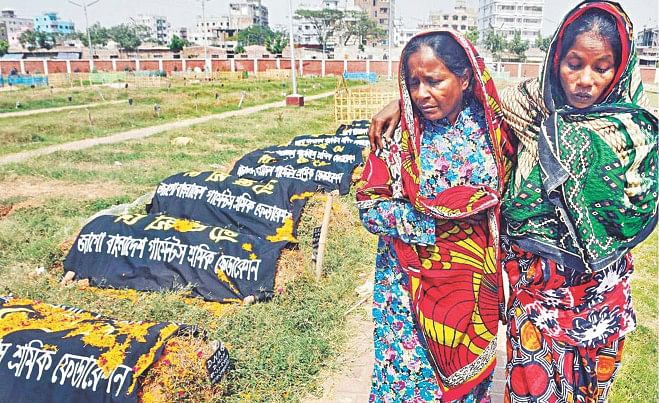Good job done
 In the year after the Rana Plaza disaster, 31 percent of the stakeholders' initiatives to upgrade labour and safety standards in the garment industry were implemented while 60 percent saw some level of progress, Transparency International Bangladesh said yesterday.
In the year after the Rana Plaza disaster, 31 percent of the stakeholders' initiatives to upgrade labour and safety standards in the garment industry were implemented while 60 percent saw some level of progress, Transparency International Bangladesh said yesterday.
But there has been no improvement in the remaining 9 percent of the initiatives that involve major areas such as the creation of a separate ministry for the sector and a central worker database, raising the amount of compensations, and stopping random sacking of workers.
"We are pleasantly surprised to see how Bangladesh, despite all challenges, made positive strides in improving working conditions and protecting workers rights," TIB Executive Director Dr Iftekharuzzaman told reporters in the capital.
"We are proud to say that Bangladesh has proved it can tackle disasters even of the scale of Rana Plaza. This is the message we want to give to the international community."
"But we don't see much-needed progress in areas that can ultimately give the garment workers long-term security and ensure their due rights. If we can't do it, the industry will remain as a sector of exploitation," he said.

The anti-graft organisation released a report “Governance Challenges in the Ready-made Garments Sector: Pledges and Progress” at a press conference in the city's Abakash Hotel.
The report assessed the country's progress in improving labour standards and working conditions since the garment industry saw its worst disaster on April 24 last year.
The latest report is a follow-up on a TIB assessment in October last year.
In the previous assessment, the TIB identified 63 areas of governance challenges that Bangladesh needed to overcome to ensure a better workplace for more than four million garment workers.
Of the 102 initiatives by the government, factory owners and other stakeholders, 31 percent has been implemented and 60 percent is in process.
The report praised the government for turning the factory inspection directorate into a full-fledged department, amending labour laws, formulating occupational and health policy, allowing trade unions, appointing more inspectors and raising minimum wages.
It also pointed out some challenges, and said there might be irregularities in the registration of trade unions.
The TIB called for ensuring transparency in compensating the injured and the families of dead workers from government fund.
"Many individuals and companies have donated money to the fund. The government should publish updated information on the fund at least once a month," said Iftekharuzzaman.
A major challenge is the lack of coordination among all stakeholders. Another disappointment is the delay in resolving cases filed against the owners of Tazreen Fashions and Rana Plaza, the TIB said.
The organisation reiterated its call for a separate ministry for the garment sector, saying 17 ministries and departments are involved with the key industry but they lack coordination.

It suggested that the government establish a Garments Sector Governance Authority until the ministry is set up.
The TIB said there has been no visible progress in shifting garment factories from the capital to the proposed apparel village in Munshiganj.
Besides, the pace of factory inspection by buyers and the government is slow, and in some cases, the inspection lacked desired level of transparency, said the TIB.
Governance challenges are multi-dimensional, and collusive corruption has been pervasive in the sector, Iftekharuzzaman said.
"All stakeholders have shown commitment to face those head-on."
Corruption has crept into the sector over the last 30 years and it would not go in just a year or two, he said.
TIB Chairperson Sultana Kamal said these positive initiatives have only laid the necessary foundations which are far from sufficient to bring about a sustainable change.
"The process for a positive change has begun. But there are still concerns in some fundamental areas."
The TIB pointed to the delay in bringing to justice those responsible for tragedies in the sector.
"If the people responsible for the Rana Plaza disaster are not brought to book, the whole achievement would fall apart and the progresses achieved so far will go in vain," said Iftekharuzzaman.
Referring to some buyers' withdrawal of orders from Bangladesh, the TIB reminded international buyers and companies of their responsibility.
On the basis of newspaper reports, it said about 25 factories were shut down over the last one year, leaving 50,000 workers jobless.
“We can see a deficiency of accountability among buyers. If this trend continues and buyers fail to act responsibly, thousands more will lose jobs," said Iftekharuzzaman.

 For all latest news, follow The Daily Star's Google News channel.
For all latest news, follow The Daily Star's Google News channel. 



Comments